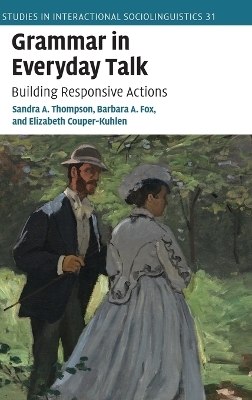
Grammar in Everyday Talk
Building Responsive Actions
Seiten
2015
Cambridge University Press (Verlag)
978-1-107-03102-9 (ISBN)
Cambridge University Press (Verlag)
978-1-107-03102-9 (ISBN)
Drawing on everyday telephone and video interactions, this book surveys how English speakers use grammar to formulate responses in ordinary conversation. Speakers build their responses in a variety of ways: the responses can be longer or shorter, repetitive or not, and can be uttered with different intonational 'melodies'.
Drawing on everyday telephone and video interactions, this book surveys how English speakers use grammar to formulate responses in ordinary conversation. The authors show that speakers build their responses in a variety of ways: the responses can be longer or shorter, repetitive or not, and can be uttered with different intonational 'melodies'. Focusing on four sequence types: responses to questions ('What time are we leaving?' - 'Seven'), responses to informings ('The May Company are sure having a big sale' - 'Are they?'), responses to assessments ('Track walking is so boring. Even with headphones' - 'It is'), and responses to requests ('Please don't tell Adeline' - 'Oh no I won't say anything'), they argue that an interactional approach holds the key to explaining why some types of utterances in English conversation seem to have something 'missing' and others seem overly wordy.
Drawing on everyday telephone and video interactions, this book surveys how English speakers use grammar to formulate responses in ordinary conversation. The authors show that speakers build their responses in a variety of ways: the responses can be longer or shorter, repetitive or not, and can be uttered with different intonational 'melodies'. Focusing on four sequence types: responses to questions ('What time are we leaving?' - 'Seven'), responses to informings ('The May Company are sure having a big sale' - 'Are they?'), responses to assessments ('Track walking is so boring. Even with headphones' - 'It is'), and responses to requests ('Please don't tell Adeline' - 'Oh no I won't say anything'), they argue that an interactional approach holds the key to explaining why some types of utterances in English conversation seem to have something 'missing' and others seem overly wordy.
Sandra A. Thompson is Research Professor of Linguistics at the University of California, Santa Barbara. Barbara A. Fox is Professor of Linguistics at the University of Colorado, Boulder. Elizabeth Couper-Kuhlen is a senior researcher associated with the Center of Excellence for Research on Intersubjectivity in Interaction at the University of Helsinki in Finland.
1. Introduction; 2. Responses in information-seeking sequences with 'question-word interrogatives'; 3. Responses in informing sequences; 4. Sequences with assessment responses; 5. Responses in request-for-action sequences; 6. Conclusions.
| Erscheint lt. Verlag | 4.6.2015 |
|---|---|
| Reihe/Serie | Studies in Interactional Sociolinguistics |
| Zusatzinfo | 45 Tables, black and white; 40 Halftones, unspecified |
| Verlagsort | Cambridge |
| Sprache | englisch |
| Maße | 158 x 237 mm |
| Gewicht | 660 g |
| Themenwelt | Geisteswissenschaften ► Philosophie ► Erkenntnistheorie / Wissenschaftstheorie |
| Geisteswissenschaften ► Sprach- / Literaturwissenschaft ► Sprachwissenschaft | |
| Sozialwissenschaften ► Kommunikation / Medien ► Kommunikationswissenschaft | |
| Sozialwissenschaften ► Soziologie | |
| ISBN-10 | 1-107-03102-8 / 1107031028 |
| ISBN-13 | 978-1-107-03102-9 / 9781107031029 |
| Zustand | Neuware |
| Haben Sie eine Frage zum Produkt? |
Mehr entdecken
aus dem Bereich
aus dem Bereich
die Grundlegung der modernen Philosophie
Buch | Softcover (2023)
C.H.Beck (Verlag)
CHF 25,20
Buch | Softcover (2023)
Reclam, Philipp (Verlag)
CHF 9,80

![Was heißt Denken?. Vorlesung Wintersemester 1951/52. [Was bedeutet das alles?] - Martin Heidegger](/media/113619842)
